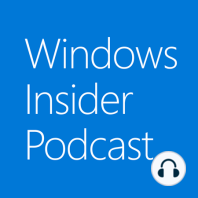17 min listen
Closing the Digital Divide
ratings:
Length:
35 minutes
Released:
Feb 28, 2018
Format:
Podcast episode
Description
What does the world stand to lose without equal access to technology and the internet? Microsoft’s Dona Sarkar and Leonardo Ortiz discuss the Microsoft Airband Initiative and why the future of jobs and education make closing the digital divide more important than ever. Then, Windows Insider MVP Andre DaCosta from Jamaica, shares his thoughts on the power of connectivity, plus a few tips for optimizing Windows while having limited access to the internet. Episode transcript JASON HOWARD: Welcome to the Windows Insider Podcast. You're listening to Episode 12. I'm your host, Jason Howard. Today, we're exploring the digital divide and access to the Internet, what does the world stand to lose if some people have access to technology and the Internet and other people don't; what can be done about the digital divide; and why should all tech companies care. Those questions and more coming up in this episode. First up, Dona Sarkar, head of the Windows Insider Program, chats with Leonardo Ortiz of Microsoft Philanthropies about how the digital divide profoundly affects communities, education, and employment. Here are Leonardo and Dona. LEONARDO ORTIZ: My name is Leonardo Ortiz. I've been in Microsoft for 18 years now, and I currently work for the Microsoft Philanthropies group where I oversee our global execution. DONA SARKAR: Which is, you know, kind of amazing LEONARDO ORTIZ: It's definitely fun, you know, and it has to do with figuring out how we land our programs all over the world. DONA SARKAR: That's right. So as a society we're in the middle of an exciting technological transformation, but there's billions of people around the world, and millions right here in the U.S. who don't have access to tech and the Internet. Why is this issue of digital divide so critical, and why is Microsoft Philanthropies so committed to solving it. LEONARDO ORTIZ: As you say, you know, the world is changing at a very rapid pace. Everything is becoming more digital, which means the way in which we work, the way in which we learn, the interaction with government, with commerce. And as the world becomes more digital, when you have more than half of the population in the world with no access to technology or connectivity, which on itself shouldn't matter that much but for the fact that that connectivity allows you to access opportunities, content, knowledge, services, then these people are lagging behind even in a more rapid pace. They are underserved already, and the gap gets just widening in a more dramatic way. And they're not being able to advance and access technology by market means, which means that companies like Microsoft, we really need to step up and do some extra work in addition to what we normally do in our business model to ensure that technology advances but that we left no one behind, to the extent possible. DONA SARKAR: You said over 50 percent of the world has no connectivity. LEONARDO ORTIZ: Exactly. DONA SARKAR: That's enormous. LEONARDO ORTIZ: Not even a feature phone, nothing. DONA SARKAR: Nothing. LEONARDO ORTIZ: Nothing. DONA SARKAR: So more than 50 percent of the world is never connected. LEONARDO ORTIZ: Exactly. DONA SARKAR: That's pretty extraordinary. And I know you guys have been doing a lot of work over the past few years to ensure that people in communities have access to the opportunities that tech provides. Can you tell us a little bit about what you've been doing. LEONARDO ORTIZ: Yes. So our main goal is to bridge that digital divide, to ensure that people have access to technology, but most important to ensure that people is ready for the future. In a world in which we're going to see more artificial intelligence, more robotics, the way of working is going to evolve rapidly. We need to make sure, and I'm going to start with young people, that all the future generations that will come to the workforce are future ready, that they're learning not only how to use technology but how to create te
Released:
Feb 28, 2018
Format:
Podcast episode
Titles in the series (51)
Insiders For Good: Windows Insider Podcast Episode 1 by Windows Insider Podcast
